Selective Laser Sintering = Powder sintering: polyamide particles are agglomerated by a CO2 laser.
Rapid prototyping, 3D printing or additive manufacturing?
Browse our 3D printing glossary to get a better understanding of all the technical terms and acronyms commonly used in our industry.
Don’t hesitate to
contact us
if you wish to add or correct any.

Computer-aided design = includes all the software and geometric modeling techniques used to design, virtually test and produce manufactured products, as well as the tools used to manufacture them.
Unit of grain measurement for the grained surface of an object.
Layer thickness measures the height of each addition of material in additive manufacturing or 3D printing processes based on stacking layers.
FABrication LABoratory = community digital fabrication workshop open to all (tinkerers, designers, artists, students, hackers, etc.). It is equipped with computer-controlled machines and must comply with a charter drawn up by MIT.
A manufacturing process involving the addition of material, usually computer-aided.
Fused Deposition Modeling = deposition of plastic in successive layers. The machine deposits a thread of molten plastic through a nozzle.
Electronic file representing an object in three dimensions. It is designed by 3D modeling to enable the desired object to be printed with a 3D printer. 3D files are created using CAD.
Glass filled= Chargé verre: material filled with glass fibers.
Mineral Fiber Filled: material filled with mineral fibers.
Additive manufacturing process. Here are some of the technologies that coexist: FDM, SLA and Selective Laser Sintering …
Machine for manufacturing 3-dimensional parts by depositing successive layers of molten material.
Partial or complete representation of an object (existing or planned) to test and validate certain aspects. The model can be produced to a given scale, usually reduced or enlarged for easier viewing.
Object obtained by 3D modeling.
A step in three-dimensional computer graphics that consists in creating a three-dimensional object in 3D modeling software, by adding, subtracting and modifying its components.
HP‘s own technology. To find out more, please visit our page dedicated to
this technology
.
Polyamide: polymer plastic.
Polycarbonate: polymer plastic.
High-density polyethylene: polymer plastic.
Matter that reacts on contact with light radiation.
Chemical reaction or process by which small molecules react with each other to form molecules with higher molar masses.
Poly-Propylene: polymer plastic.
A computer-controlled manufacturing method that brings together a set of tools which, when combined, produce intermediate representation projects for product design: mock-ups, prototypes and pre-production runs.
An original model that has all the technical qualities and operating characteristics of a new product, but is also sometimes an incomplete example of what a product could be.
Reaction Injection Molding = By creating a mold in epoxy or silicone resin (previously from a Stereolithography master model), a prototype can then take shape.
StereoLithography Apparatus = Stereolithography: polymerization of a photosensitive epoxy resin by ultraviolet laser, in layers of 0.10 to 0.15 mm.
Selective Laser Sintering = Powder sintering: polyamide particles are agglomerated by a CO2 laser.